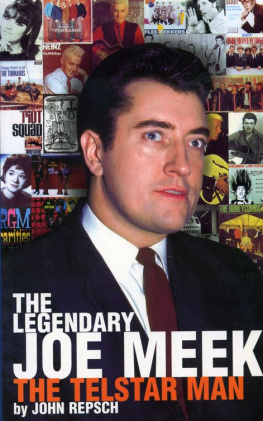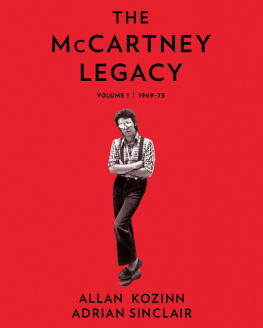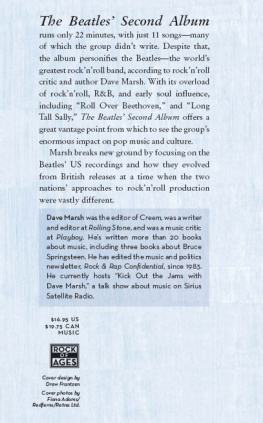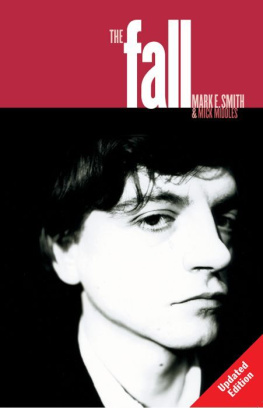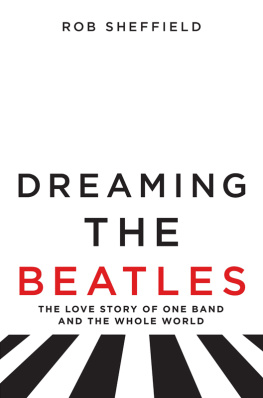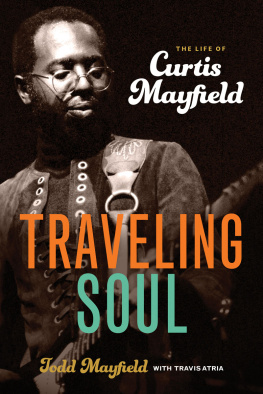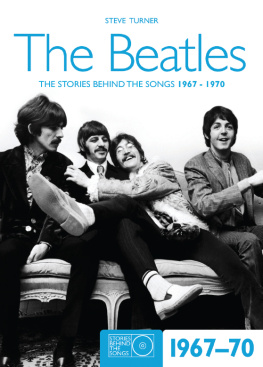Repsch - 2000;2008;
Here you can read online Repsch - 2000;2008; full text of the book (entire story) in english for free. Download pdf and epub, get meaning, cover and reviews about this ebook. City: London, year: 2000;2008;2011, publisher: Cherry Red Books, genre: Detective and thriller. Description of the work, (preface) as well as reviews are available. Best literature library LitArk.com created for fans of good reading and offers a wide selection of genres:
Romance novel
Science fiction
Adventure
Detective
Science
History
Home and family
Prose
Art
Politics
Computer
Non-fiction
Religion
Business
Children
Humor
Choose a favorite category and find really read worthwhile books. Enjoy immersion in the world of imagination, feel the emotions of the characters or learn something new for yourself, make an fascinating discovery.
- Book:2000;2008;
- Author:
- Publisher:Cherry Red Books
- Genre:
- Year:2000;2008;2011
- City:London
- Rating:3 / 5
- Favourites:Add to favourites
- Your mark:
- 60
- 1
- 2
- 3
- 4
- 5
2000;2008;: summary, description and annotation
We offer to read an annotation, description, summary or preface (depends on what the author of the book "2000;2008;" wrote himself). If you haven't found the necessary information about the book — write in the comments, we will try to find it.
The classic biography of one of the greatest record producers of all time - a man who famously rejected The Beatles. Joe Meek broke the boundaries of pop production in the 1950s and 60s, and dominated the music industry for a period, despite his outsider, renegade approach. Famously, his life ended tragically when he shot both himself and his landlady in 1967, but his legacy remains, and is explored wonderfully in The Telstar Man.
2000;2008; — read online for free the complete book (whole text) full work
Below is the text of the book, divided by pages. System saving the place of the last page read, allows you to conveniently read the book "2000;2008;" online for free, without having to search again every time where you left off. Put a bookmark, and you can go to the page where you finished reading at any time.
Font size:
Interval:
Bookmark:
N O ONE HAS EVER LIVED A LIFE LIKE J OE M EEK. S URROUNDED BY intrigue and controversy, he was Britains first truly independent pop producer and set the ball rolling for the hundreds who envelop the scene today.
He was the man who against all the odds produced hit after hit in his flat in Londons busy Holloway Road. In the pre-Beatles era when the British music industry was being run by the likes of EMI and Decca, and Britain was lying stranded in a sea of tepid cover versions of American teen idols, he decided to go it alone and battle it out with the giants.
From an Aladdins Cave of dusty wires and ropey old spinning tape machines he developed a unique sound which made his records instantly recognizable. It gave them an exciting, spiritual feel which is still to this day so attractive that his discs are collectors items and sell for very high prices. He even has a fan club!
Working from two bedrooms, his fine-fingered electronics wizardry was a wonder to behold, and the incredible sounds he created could make your hair stand on end. Like an eccentric scientist he worked all hours bending every rule in the book, turning music inside out and reconstructing it. He was the master of cramming everything onto one single track and for years was so advanced that no one in Britain could touch him.
However, behind all the success lurked personal problems and an ever shadier private life. Early in 1967, under mysterious circumstances , he was found dead. He was 37.
Joe was an enigma. His volcanic temperament and strange behaviour were never fully understood and were simply regarded as the trappings of genius. An intensely secretive man, no one really knew him or was even aware of half his peculiar story. Consequently, researching his life has taken far longer than I expected, luring me along from one riddle to another.
Gathering facts has also been hampered in other ways. From time to time people have withheld information for fear of divulging how closely involved they were with him. Friendly smiles hide serious anxieties that sadly will always be with them. In a few instances I have even been given deliberate misinformation; to this day there are still singers and musicians harbouring grudges against Joe and against each other. Through constant verification of facts I am satisfied that any such false statements have been eliminated.
So, with this in mind, it will come as no surprise that this little volume is the result of four years work, including more than 150 taped interviews and 500 hours of telephone conversations.
This is a chance to say thank you again to everyone who has contributed. Whether by answering my phone calls, replying to my letters or allowing me and my tape recorder into their homes and offices, they have helped make it all enjoyable and rewarding. I would have liked to acknowledge everyone but their names would fill two pages. I can mention just a few: Eric and Arthur for their wealth of memories and warm hospitality; Ena Shippam; Gerald Beachus; Allen Stagg; Adrian Kerridge; Jimmy Lock; Lonnie Donegan; Anne Shelton; Humphrey Lyttelton; Chris Barber; George Melly; Frankie Vaughan; Peter Cozens; William Barrington-Coupe; Marcel Rodd; Norman Shine; Lester Banks; Stanley Souter; Bob Kingston; Geoff Goddard; Robbie Duke; Terry ONeil; Gary Hartnell and his mum of Polygram and Pye; James Deveraux of EMI; Pc James Ainsworth; E. M. Solomons; Ken Howard; Sir Joseph Lockwood; John Leyton; Michael Cox; Mike Berry; Clem Cattini; Heinz; Lord Sutch; Chas Hodges; Joy and Dave Adams; Pete Holder; Dave Dee; Lional Howard; Tony Grinham; Barry Lazell; Paul Pelletier; Brian Matthew and Radio One; New Musical Express; Melody Maker; Record Mirror; Music Echo; Disc; Pop Weekly; Billboard; Cashbox; Daily Express; Evening News; Evening Standard; Psychic News; Nigel Hunter of Music Week; West Hampstead Cemetery; Chris Charlesworth for his professional advice; Keith Waller for his internet assistance; David Pearce for allowing me access to the Meek Estate files; John Beecher and the Buddy Holly Appreciation Society; the RGM Appreciation Groups Alan Blackburn, Laurence Brown, Hinton Sheryn, Rockin Tom Casey for playing me the music; Chris Knight for his reams of letters and the 30 interviews he had conducted with Jim Blake eight years before I started, and the latter who set me on the trail.
A final thank you goes to the man himself for being such a bewitching subject; he would not have liked having his secrets revealed, but I think he would have appreciated his long overdue credit.
John Repsch
F ebruary 2 1967. Evening. 304 Holloway Road. Meeks final hours, described by his office assistant, Patrick Pink: He looked clearly sort of sick. He wasnt talking writing things down. In the evening we watched some TV and had something to eat. That would be about 7 oclock. I think I cooked it. He was writing on bits of paper; he was afraid the place was bugged and that he was being listened in to. He suddenly asked me after dinner, Lets go up, lets make your record. Youre more or less up to standards now. Id only recorded demos before but this particular one was promised to come out in March, my own. I have a feeling he had it planned. That was the night. After all those years Id been with him and Id stayed sometimes the night and that particular night: Come on, lets see if we can get a record out of you now.
About 9 oclock we went up into the studio. He had some tracks already made up: the backing tracks. I just did a couple of old ones he had stored away and Id learnt the words from the acetates very quick attempts: about an hour. Then I did another one which Id learnt. It was a backing that was laid down for Heinz; he had already voiced it and the voice had been taken off of it. Heinz had sung it years ago: There goes my baby look at the way she walks. Joe wrote it. Went on the radio once Heinz did it live. Nothing had been put out on record, and Joe said I could have it and get it released.
Then all of a sudden he went really weird and told me to start miming to my own recording said, Just stand there and mime theyre watching us through the walls. Theyre watching and listening . Ive no idea who these people were. Possibly EMI, because days previously hed pointed out to me people in cars sitting down the road, possibly with listening devices, had his place bugged, and they were watching him every time he came in and out and following him everywhere. He got worse then and it started to play on his mind. It might well have been true and he wasnt nuts completely . I genuinely believe, even though he was going off his rocker, that there were people bugging his place. I genuinely believe it now; or whether it was the police watching his place, Ive no idea. Maybe the police had it bugged; might have been the Drug Squad.
I was recording the same song over and over and over and over again. I dont think he knew what he was doing at all. He was putting on a show basically for the benefit of earholes, people listening in. On the bits of paper he was writing: Sing it again, More coffee. I had to keep going down to make coffee. The session would have been about three hours. I went to bed at midnight absolutely shagged out.
I was in bed when he came up to get the gun. It was a single-barrel shotgun. He kept it under the bed for protection. He said, Im taking this downstairs. I never gave it a thought.
At 8 oclock in the morning he was still working, running tapes and things. I got up. 9 oclock I made toast for breakfast and called him down from the studio: Breakfast. He came down, drank the coffee. I dont think he ate the toast pretty sure he didnt eat at all. He wouldnt talk at all. He wrote little notes, passed them over and burnt them after hed wrote them. After hed drunk his coffee he went out in the kitchen and had a burn-up. First of all he was burning a lot of documents, letters and things in the kitchen; it was in a small tin dustbin. He had a bonfire in that. Angry about something no idea what; he was very angry. The previous day he had just been dazed. Now hed changed. I think he had his senses Im bloody sure he had. He was absolutely paranoid but tense and angry. He wrote two or three messages: Theyre not getting this. Theyre not getting these. He went mad and he wrote: They arent going to f get this, and he started to burn that painting on the wall: the one with the little black boys dancing naked round a fire. He put the painting on top of a fire the two-bar fire which scorched it all up. I thought it was strange but I didnt think it was coming to what happened . I thought at the time he was going out of his head and I was going to call Dr. Crispe and he stopped me. He was down for about half an hour. Then he disappeared upstairs to the studio for a little while. I thought, Crikey, Ill be safer to stay down here. So I stayed downstairs. And he came back down to the living room. I think it was about quarter to ten. Give me a little note saying: Im going now. Goodbye. And I didnt know what it meant. I laughed. I thought, Where? The note got burnt and upstairs he went. I thought,Well everythings OK then. Cause he was upstairs playing tapes my stuff from the night before. That went on for ten to fifteen minutes.
Font size:
Interval:
Bookmark:
Similar books «2000;2008;»
Look at similar books to 2000;2008;. We have selected literature similar in name and meaning in the hope of providing readers with more options to find new, interesting, not yet read works.
Discussion, reviews of the book 2000;2008; and just readers' own opinions. Leave your comments, write what you think about the work, its meaning or the main characters. Specify what exactly you liked and what you didn't like, and why you think so.

